| SOSTANZE D'ABUSO: CANNABIS |
| |
|
"MENTE SULLA MATERIA" - LA RISPOSTA DEL CERVELLO ALLA MARIJUANA (NATIONAL INSTITUTE ON DRUG ABUSE)
|
|
National Institute on Drug Abuse ·
National Institutes of Health

Mind Over Matter Index
|
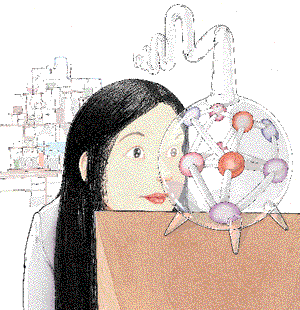
This series is designed to encourage young
people in grades five through nine to learn about the effects of drug
abuse on the body and the brain.
Mind Over Matter is produced by the National Institute
on Drug Abuse, National Institutes of Health. These materials are in
the public domain and may be reproduced without permission. Citation
of the source is appreciated.
This page has been accessed 353811 times since
2/5/1998.
|
The Brain's Response to:
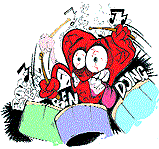
|
The Brain's Response to
Marijuana
|
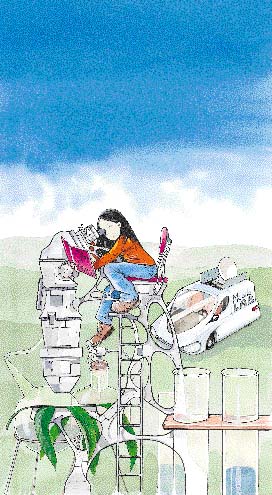 |
|
Hi,
my name is Sara Bellum. Welcome to my magazine series exploring the
brain's response to drugs. In this issue, we'll investigate the fascinating
facts about marijuana. Some of this information was only recently discovered
by leading scientists.
You may have heard it called pot,
weed, grass, ganja or skunk, but marijuana by any other name is still
a drug that affects the brain.
Did you know marijuana can cause
some people to lose focus on events around them? It makes others more
aware of their physical sensations, and it has still more effects on
other people.
All these different changes are caused
by chemicals that affect the brain. More than 400 chemicals are in the
average marijuana plant. When smoked, heat produces even more of them!
|
| Where Does
Marijuana Come From? |
|
Marijuana is the dried leaves
and flowers of the hemp plant (Cannabis sativa). Like all
plants it's sensitive to the environment where it grows.
|
Different weather and soil
conditions can change the amounts of the chemicals inside the
plant. That means marijuana grown in a place like Hawaii might
be chemically stronger than marijuana from Mexico or vice-versa.
|
|
Mind Over Matter
Marijuana Series - page 2
National Institute on Drug Abuse · National Institutes
of Health
| |
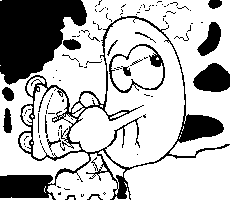 |
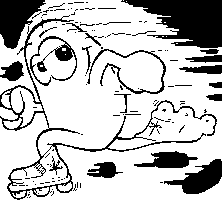 |
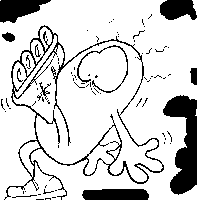 |
| How does marijuana affect nerve cells
in the brain? Marijuana causes some parts of the brain - |
| |
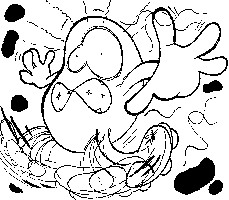 |
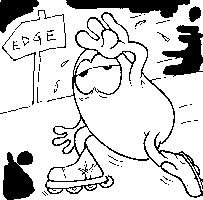 |
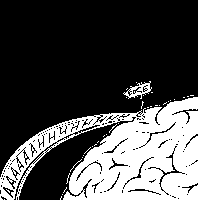 |
| such as those governing emotions, memory
and judgement -- to lose balance and controoooooooooooooooooooooooolllllllll. |
|
Mind Over Matter
Marijuana Series - page 3
National Institute on Drug Abuse · National Institutes
of Health
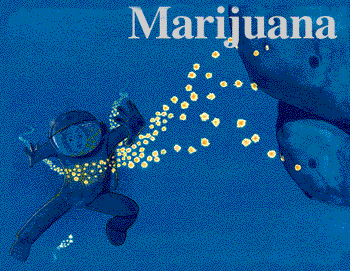 |
| Invades the Brain |
|
How do the chemicals
in marijuana change the way a person sees, hears, smells, tastes,
and feels things?
When someone uses marijuana, these chemicals
travel through the bloodstream and quickly attach to special places
on the brain's nerve cells. These places are called receptors,
because they receive information from other nerve cells and from
chemicals. When a receptor receives information, it causes changes
in the nerve cell.
The chemical in marijuana that has a
big impact on the brain is called THC -- tetrahydrocannabinol.
(Whew! Try saying that 10 times fast.) Scientists recently discovered
that some areas of the brain have a lot of THC receptors, while
others have very few or none. These clues are helping researchers
figure out exactly how THC works in the brain.
|
|
| |
| Marijuana
may cause some parts of the body to react in different ways. What
do you remember about: |
| a |
Rapid Heartbeat
-- up to how many beats per minute? |
|
| b |
Dilated blood vessels -- can
be seen in what part of the body? |
| c |
A feeling of panic -- accompanied
by what kind of sensations? |
| d |
Daily cough and more frequent
chest colds very much like who? |
|
Mind Over Matter
Marijuana Series - page 4
National Institute on Drug Abuse · National Institutes
of Health
|
One region of the brain
that contains a lot of THC receptors is the hippocampus, which processes
memory. When THC attaches to receptors in the hippocampus, it weakens
short-term memory
The hippocampus also communicates with other
brain regions that process new information into long-term memory. (That's
how you can remember today's math lesson or a new friend's phone number.)
In the brain, under the influence of marijuana, new information may
never register - and may be lost from memory.
|
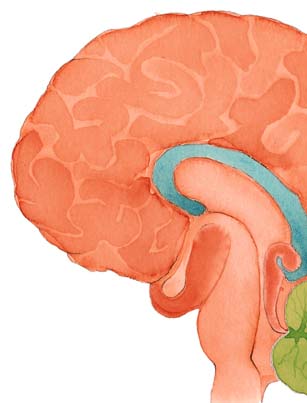
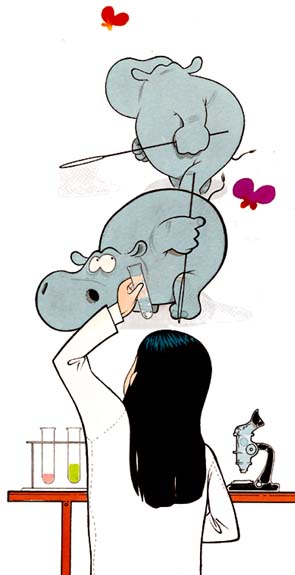
|
|
|
|
Maybe you've heard that
in some people, marijuana can cause uncontrollable laughter one minute
and paranoia the next. That's because THC also influences emotions,
probably by acting on a region of the brain called the limbic system.
And don't forget this: THC can make something
as simple as driving a car really dangerous.
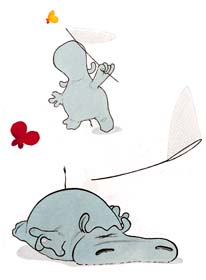
The
Search
Continues
Some of THC's effects are useful in the world
of medicine -- like preventing nausea and blocking pain. The trick is
for scientists to get these results without the harmful effects.
Researchers recently found out the brain makes
a chemical -- anandamide -- that attaches to the same receptors as THC.
This discovery may lead to the development of medications that are chemically
similar to THC but less harmful, and they may be used for treating nausea
and pain.
|
Mind Over Matter
Marijuana Series - page 5
National Institute on Drug Abuse · National Institutes of Health
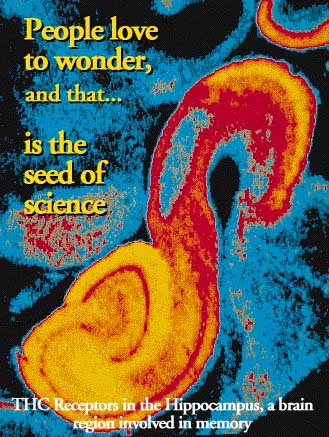
Photo: Miles Herkenham, NIH |
For printed copies of this publication contact:
National Clearinghouse
for Alcohol and Drug Information
P.O. Box 2345 1-800-729-6686
Mind Over Matter is produced
by the National Institute on Drug Abuse, National Institutes of Health.
These materials are in the public domain and may be reproduced without
permission. Citation of the source is appreciated.
|
NIH Publication No. 97-3859. Printed 1997
Rockville, MD 20847
|
Review
a cura del Gruppo Evelink - release dicembre 2000 - Fonti: CD-ROM "Stupefacente",
a cura della Guardia di Finzanza; Il sito ufficiale dell'UNOCCP (United
Nations Office for Drug Control and Crime Prevention); Medline
|
|
|
| Primo Piano Dipartimento Politiche Antidroga
Presidenza del Consiglio dei Ministri |
- Principi generali della posizione italiana contro l’uso di droghe ( IT, EN)
- Accordo di collaborazione scientifica Italia-USA ( IT, EN)
- Dichiarazione DPA collaborazioni scientifiche internazionali ( IT, EN) |
|
|
|
| Oggi i giornali parlano di droga |
|
|
|



























